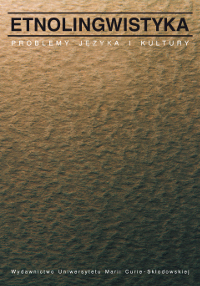Jak badać językowo-kulturowy obraz świata Słowian i ich sąsiadów?
How should one go about investigating the linguistic worldview of Slavs and their neighbours?
Author(s): Jerzy Bartmiński, Wojciech ChlebdaSubject(s): Anthropology, Language and Literature Studies, Applied Linguistics, Cognitive linguistics
Published by: Wydawnictwo Naukowe Uniwersytetu Marii Curie-Sklodowskiej
Keywords: linguistic-cultural worldview; intercultural comparative studies; Slavic comparative studies; trans-national comparative studies; European comparative studies; collective identity; ethnolinguistics; a
Summary/Abstract: The authors assume that ethnolinguistic research in its nature attempts to uncover and describe communal, mainly national identity. They ask to what extent the linguistic worldview conception is useful for the purpose. The conception opens new vistas for comparative research on Slavic and, on a wider scale, European cultures and so it has been included into the research programme of the International Slavic Committee’s ethnolinguistic group. Having discussed the linguistic and cultural manifestations of group identity (verbal and non-verbal signs), the authors present the ways in which research on language and textual narration can contribute to a reconstruction of the feeling of communal identity. In ethnolinguistic research, the content of “national concepts” (e.g. Polishness, Russianness, Czechness etc.) should be investigated on the basis of four groups of sources: a) dictionaries; b) contemporary texts of public discourse, especially from the domain of high-level journalism; c) corpora of the ethnic language and internet searches; d) questionnaires, which are “elicited texts” (with preference given to open questionnaires). In intercultural comparisons one must above all consider the values of the communities which they adopt as the exponents of their respective identities. This means that one must return to the idea of an axiological dictionary, which idea can render Slavic and generally intercultural research internally coherent and comparable.
Journal: Etnolingwistyka. Problemy Języka I Kultury
- Issue Year: 20/2008
- Issue No: 20
- Page Range: 11-27
- Page Count: 17
- Language: Polish

